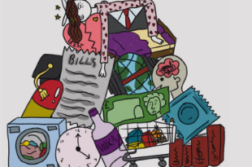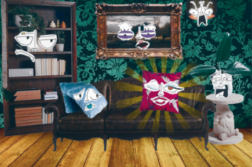The very recent television series “As We See It” is a crucial and authentic stab at the realities of living with autism. By depicting the lives of 20-something autistic individuals— Violet and Harrison— the show aims to offer a more full and realistic picture of the autistic experience. And, having watched the show as an autistic person, I have to say that I think it ultimately achieved its goal— especially because it depicted aspects of the autistic experience that I can’t quite relate to.
For example, one of the show’s protagonists, Violet, is desperate to achieve what she imagines to be “a normal life.” From her perspective, that means a boyfriend, a job, and a very active sex life. Unfortunately, however, Violet struggles with social interaction, and so she often comes across as inappropriate in her attempts to pursue these goals. Likewise, Harrison struggles with paralysing anxiety that prevents him from leaving the house. In his therapy sessions, Harrison works to overcome one overarching obstacle: walking down the block to the coffee shop.
As We See It depicts both of these struggles with empathy and sensitivity. It explores the reality of Harrison and Violet’s experiences without invalidating them or implying that they are weird or “less than” by virtue of their struggles. But, as an autistic person who moved from Small Town, USA to England to pursue a PhD halfway across the world, I initially felt as though I couldn’t relate.
And, to an extent, that’s true. As We See It makes it clear that, for Harrison and Violet, many everyday aspects of a “normal” life— such as having a job, making friends, or pursuing romantic relationships— are so difficult that they seem almost unattainable. Thus, it’s equally clear that activities like an international move and an intense postgraduate program are also out of reach for them.
So, as I reflected on these characters in relation to my own experience, I felt an odd mixture of confusion and pride. I initially thought I must be doing really well to have successfully handled such a major — and traditionally “neurotypical”— life event by myself. For a moment, I even wondered if I really am “as autistic” as I think I am— a ridiculous thought, given my diagnosis and the indisputable ways that I know my autism impacts my life.
But that’s when I realised that, in a neurotypical world, the autistic experience is very rarely considered outside of its limitations. Many neurotypical people— including medical professionals— assess autism solely through the ways that it prevents autistic people from playing along with neurotypical milestones and socially acceptable standards of behaviour. And when your mental health is assessed in terms of what you can’t do or how your behaviour unsettles others, I think it’s easy to start assessing yourself in the same way.
Maybe that’s why you rarely see portrayals of autistic people thriving in a neurotypical world— autistic people succeeding at things like travelling alone, moving internationally, or succeeding in a fast-paced graduate program. Maybe that lack of representation is why I struggle to connect with films that offer autistic representation and why comments on my own success give me imposter syndrome about my own diagnosis. And maybe that’s exactly the problem.
Because, in reality, my experience isn’t easy to define. It doesn’t fall neatly into the category of characters like Harrison and Violet nor does it mirror a truly neurotypical experience. Moving internationally and living on my own is difficult for me in ways that it wouldn’t be for someone who is not autistic. Because, yes, I can do coursework and pay the rent on time and form a community in a new town— even in a new country. I can do all of those things on my own with confidence.
But I also waited to pack until the night before my flight… even though I knew I needed to fit all my worldly possessions into suitcases to prepare for a basically permanent move. I procrastinate because my autism makes me intensely terrified of change— even the changes I want. When faced with major life decisions and substantial changes; my brain short-circuits. I procrastinate because some part of my brain hopes that if I never take action that will make a change real, that disruption to my routine will never occur.
I am capable of living alone and I (mostly) do so very well; no one looks at my life choices and assumes that I am incapable or in crisis. But even though I’m not quite in the same boat as Violet or Harrison, my experience is far from “normal.” It’s certainly not without challenges. And that’s why I think this type of representation is important: because people like me are still autistic and we still experience challenges that mean living on your own is an important milestone.
It’s important precisely because it’s not guaranteed; it’s not something that you are inherently expected to accomplish when you grow up. Instead, for autistic people like me, living and travelling on your own are significant in ways that differ greatly from the experience of neurotypical people. Being able to do those things doesn’t make me any less autistic but it does make me aware of the fact that these milestones are things I have to work hard to accomplish— and even harder to maintain.




